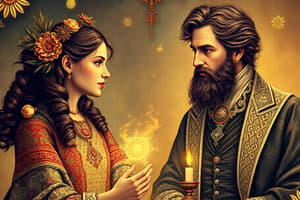Podcast
Questions and Answers
What was Galileo Galilei's most controversial scientific finding?
What was Galileo Galilei's most controversial scientific finding?
- The claim that the Earth orbits the sun (correct)
- The discovery of the telescope
- The observation of patterns on the moon's surface
- The identification of new stars in the sky
What was Galileo's justification for his heliocentric theory, which conflicted with the Church's teachings?
What was Galileo's justification for his heliocentric theory, which conflicted with the Church's teachings?
- He believed that science and religion served different purposes and should not be in conflict.
- He believed the Bible was incorrect in its interpretation of the Earth's position in the universe.
- He claimed the Church was intentionally suppressing scientific truth.
- He argued that his observations and experiments provided clear evidence that the Earth orbits the sun. (correct)
What invention did Galileo create that allowed him to make significant astronomical discoveries?
What invention did Galileo create that allowed him to make significant astronomical discoveries?
- The thermometer
- The telescope (correct)
- The compass
- The pendulum
Which of the following was NOT one of Galileo's significant astronomical discoveries?
Which of the following was NOT one of Galileo's significant astronomical discoveries?
How did Galileo's religious beliefs influence his approach to science?
How did Galileo's religious beliefs influence his approach to science?
What was the primary reason the Church had difficulty accepting Galileo's heliocentric theory?
What was the primary reason the Church had difficulty accepting Galileo's heliocentric theory?
Which of the following gadgets or instruments did Galileo NOT invent or build?
Which of the following gadgets or instruments did Galileo NOT invent or build?
Which of the following is NOT a common superstition mentioned in the text?
Which of the following is NOT a common superstition mentioned in the text?
What is the origin of the superstition surrounding the number 13?
What is the origin of the superstition surrounding the number 13?
What is the term used in the text to describe the fear of the number 13?
What is the term used in the text to describe the fear of the number 13?
What is the reason behind the superstition of not whistling backstage in theaters?
What is the reason behind the superstition of not whistling backstage in theaters?
Which of the following statements about superstitions is NOT supported by the text?
Which of the following statements about superstitions is NOT supported by the text?
What is the origin of the superstition of knocking on wood?
What is the origin of the superstition of knocking on wood?
Which of the following statements best describes the reason for the persistence of superstitions, according to the text?
Which of the following statements best describes the reason for the persistence of superstitions, according to the text?
Flashcards are hidden until you start studying
Study Notes
- Galileo Galilei, a scientist and inventor who lived around 500 years ago, became famous for his groundbreaking ideas and inventions.
- Galileo built various gadgets like compasses, thermometers, a pendulum, and a telescope to aid in his experiments and scientific inquiries.
- He discovered the telescope after hearing about children using lenses to see distant objects clearly, leading him to observe the moon, planets, and stars in great detail.
- Galileo was the first to see planets up close, identified new stars, noticed patterns on the moon's surface, and found four moons orbiting Jupiter (now called Galilean moons).
- His most controversial announcement was that the Earth orbits the sun, contradicting the common belief that everything revolved around the Earth.
- The Church had difficulty accepting Galileo's heliocentric theory as it challenged existing beliefs and interpretations of biblical texts.
- Despite conflicts with the Church, Galileo remained deeply religious, believing that science and religion serve different purposes and that the Bible focuses on guiding people morally rather than explaining scientific phenomena.
Studying That Suits You
Use AI to generate personalized quizzes and flashcards to suit your learning preferences.




